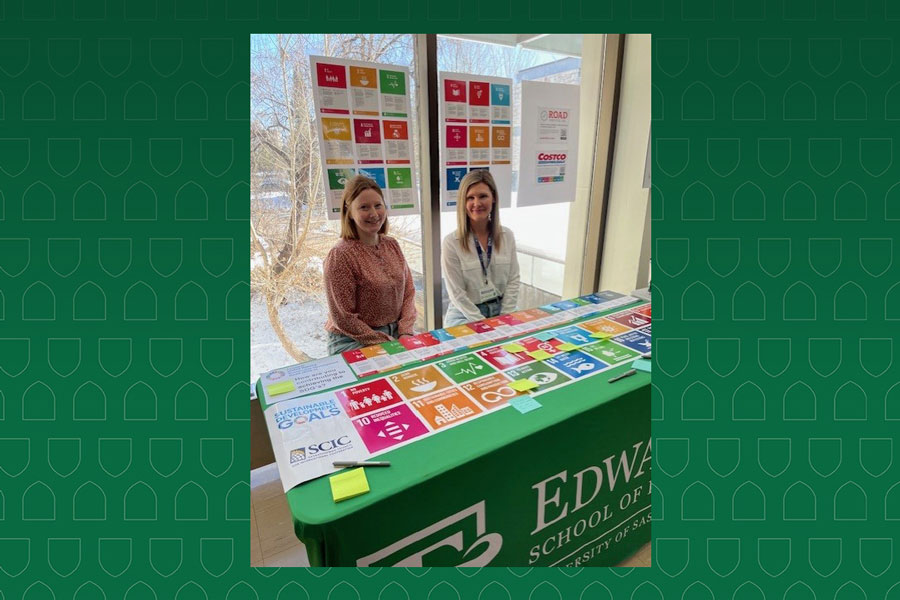
Award-winning USask business professor says capitalism and sustainability not at odds
University of Saskatchewan (USask) Assistant Professor and Sustainability Faculty Fellow Brooke Klassen (BComm'03, MBA'11) helps her students become socially conscious professionals by including sustainability learning outcomes, activities and assessments in her classes.
By DARLA READUSask alumnus Brooke Klassen (BComm'03, MBA'11), assistant professor in the Edwards School of Business and Sustainability Faculty Fellow 2022-24, recently received an Education for Sustainable Development (ESD) Recognition Award for her work in sustainability in her courses.
Klassen received the award from the United Nations University-designated Regional Centre of Expertise for Saskatchewan. She also won this year’s Dr. Garth Pickard Award, for Post-Secondary Excellence in Education for Sustainable Development. To honour her achievements and to mark Canadian Environment Week June 2-8, we asked Klassen to expand on her important work in sustainability.
You recently won an award for ESD in MBA 803, as well as the Dr. Garth Pickard Award for Post-Secondary Excellence in Education for Sustainable Development. What does it mean to you to be recognized in these ways?
It gets me so excited when I find others who share my passion for sustainability. Sometimes it can be difficult to reconcile how to approach sustainability from a traditionally capitalist perspective, but I am humbled to be recognized for the work I’ve done to show students that the two concepts are not at odds and instead help to develop stronger, more viable organizations.
What does it mean to ‘embed sustainability’ in the classes you teach?
To me, it means that I have applied the UNESCO Reflect Share Act model that was created in 2020 to assist anyone in acquiring the skills and knowledge needed to promote sustainable development in their community. I wanted students to reflect on issues, share possible solutions, and act towards meaningful change. Many of those actions happen outside the classroom, in their workplaces, social groups and communities.
Why is embedding sustainability in your classes important to you?
When I became a university instructor, I naturally gravitated towards engaging my business students in discussions around social issues. I remember showing a video where UN representatives from countries that were running out of clean drinking water asked for water to be deemed a human right. This was in 2010, and at that time, there was discussion around how scarce water could become by 2040 if the world didn’t take action. The strong reactions from students, many of whom have never worried about water security in their own lives, confirmed the importance of challenging students to think differently from very early on in their degrees. Our mission at Edwards is to enable learners to become socially conscious professionals, and my contribution comes from including sustainability learning outcomes, activities and assessments in my classes.
What kind of challenges are there in embedding sustainability in business classes?
There are several challenges, which can be connected around a central theme of doubt. Some students doubt that the world can achieve the ambitious targets set out in the UN’s Sustainable Development Goals (SDGs). Others doubt their own ability to contribute in a meaningful way. Still others doubt their role in ‘saving the world’ and put it back on the businesses and earlier generations that created the issues in the first place.
However, these aren’t reasons to give up. In fact, I use them as motivation to keep going. It is important to me that students see that they can start up, work in or even run profitable businesses that are also focused on doing what is right for the next generations to come.
I was told you are leading work on Generative AI. Can you explain what that means and why it’s important?
I am a member of the USask Artificial Intelligence (AI) Task Force, which was established to develop comprehensive principles and associated guidelines for the use of AI by the university, aligned with our core areas of research, teaching, and administration. There are many considerations around sustainability in the use of AI, and I’ve really enjoyed contributing to this work by applying the knowledge I developed through my USask Sustainability Faculty Fellowship.
How can people take action?
My hope is that highlighting how to engage students in developing sustainability-related competencies encourages others in our university community to do the same. Every action matters, no matter how large or small it may seem.
We asked Klassen how people can learn more. She suggested reading the sustainability teaching and learning practices guide written by the inaugural USask Sustainability Faculty Fellows, in which she wrote Chapter 7. She also suggested signing up for a workshop focused on community-engaged learning. People could also read her article for The Conversation titled Can marketing classes teach sustainability?
Article originally published at https://news.usask.ca


